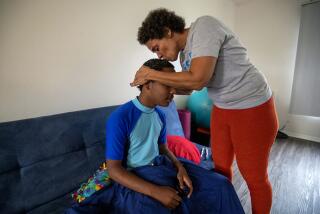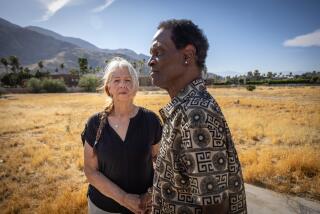Former Home ‘Had Become a War Zone’; Callers Played Funeral Music on Phone : Boy With AIDS Virus Finds a Measure of Peace in New Town
- Share via
SOUTH ROXANA, Ill. — A lonely yellow stick character, arms outstretched, looks down at 8-year-old Jason Robertson from a poster in his kitchen.
“I have AIDS,” the poster says. “Please hug me. I can’t make you sick.”
As if it were Jason speaking.
Jason suffers from AIDS-related complex, or ARC, a disease that often precedes the fatal full-blown acquired immune deficiency syndrome. At school, he was isolated in a trailer next door to the classroom, and his only real friend was a tattered doll named Mick.
Jason’s story is similar to the plight of Indiana’s Ryan White, an AIDS victim shunned at school and forced to leave town.
He has endured a lawsuit and a move from nearby Granite City to this tiny, Southern Illinois community in search of peace. Phone calls playing funeral music and taunts added to the scorn.
Picking Up the Pieces
Now his mother, Tammie; father, Al, and 10-year-old sister, Melissa, are picking up the pieces after a struggle that turned neighbor against neighbor in a battle over Jason’s future.
Jason weighs only 46 pounds and stands about 4 feet tall. His most striking features are his big brown eyes. A quiet boy, he answers most questions with few words.
“I like good people,” Jason says. “I like to go places.”
When he grows up, he says, he wants to be a police officer.
Jason was born with hemophilia, a condition in which the blood fails to clot properly. He also had stomach problems and a shortened esophagus--problems that were corrected by surgery.
But he underwent hundreds of blood transfusions, and at least one of them involved tainted blood products that brought the deadly AIDS virus into his body. In March, 1986, Jason was diagnosed with ARC.
That was the beginning. Now the family, its former school district and neighbors wish they had done some things differently.
Fearing that he would endanger other children, his mother pulled him from kindergarten in Granite City and a district tutor taught him at home until November, 1987.
That’s when the Robertsons and the school district agreed that Jason should be taught in a special trailer 50 feet from regular classes.
Jason started school 15 minutes before the other students every day and left 15 minutes later than they did. He was not allowed on the playground.
However, when Tammie Robertson learned more about her son’s disease, she became convinced that he could not infect others and sought to have him placed in regular classes among the other 750 students.
School officials say they told her that Jason probably would be placed in regular classes in the fall of 1988 because his health had improved.
But she contends that the district made the offer only after the American Civil Liberties Union, at her request, filed a lawsuit on Jason’s behalf in April.
On May 5, a federal judge ordered Jason back into regular classes. But the ruling touched off protests from parents in Granite City, a steel town of 36,800 across the Mississippi River from St. Louis.
Angry parents chanted, “Back to the trailer!” upon his arrival.
Drew Callender, 29, says he got into the fight because of anger and fear for his children’s safety. “I did say some foolish things.” He also founded an informal group of protesting parents called “SAVE,” the Society Against Virus Environment.
“It’s a fear of not knowing,” he says.
Tammie Robertson says she got up to three telephone calls a day from protesters, threatening her and Jason. People on the street hurled epithets. “Home had become a war zone, and I felt like I was dying inside,” she says.
‘She Asked for a Lot of This Stuff’
Her former neighbors insist that they never heard anyone harass the Robertson family, and they say the family had an unlisted phone number.
“If she would have just kept her mouth shut instead of going and going and going, she wouldn’t have any problem,” says Maggie Rigsby, 68, a former next-door neighbor of the Robertsons.
“She just couldn’t stay out of the TV and the newspaper, and it just made a mess,” she says. “I don’t think people should be harassed, but she asked for a lot of this stuff.”
Rigsby, who lives with her 8-year-old granddaughter, says she would not want her to get near Jason. She opposed his entry into regular classes. “It’s too contagious, and I don’t know enough about it.”
“Nobody harassed her in this neighborhood,” says Alice Perkins, 34, who lived next door to the family for nearly 10 years. “There was no vigilante group.”
To protest state cuts in funding for hemophiliacs, Tammie Robertson contacted two newspapers, including the Post-Dispatch, and the family’s life became public record.
“I did not comprehend that it would be this big of an issue,” says Tammie Robertson. “Maybe we made some mistakes. I was doing what was best for my kids.”
Stu Mills, the Granite City district’s supervisor of special educational programs, describes her as “volatile.” She often initiated confrontations. But he says he has sympathy for any parents in the Robertsons’ situation.
He says that the mother of an AIDS child thinks she has special license to say whatever she wants, even characterizing one town as the good guys and the other as the bad.
Tammie Robertson says the family decided to leave Granite City after a man accosted her and hit her on the head with a stick.
They moved to nearby South Roxana, an oil refinery town of 2,300, to the home where Jason’s father, who manages a plastics company, grew up. It was a good move for Jason.
“He just smiles all over,” says Sharon Waters, a teacher’s aide and registered nurse hired for Jason’s second-grade room at the 375-student South Roxana Elementary School.
“His little eyes just dance; they talk more than he does,” she says. “I think he’s happy. Just to see him play, like when he gets the right answer, he gets real excited.”
At first, she said, Jason didn’t know how to deal with his classmates, because he had had only limited contact with children his age for nearly two years. But they encouraged him, and in days he made friends.
Seldom Misses School
South Roxana Principal Dorothy Stickels calls Jason an “average second-grader” in a class of 24. His writing has improved, and he seldom misses school, she said. “I see him every morning with his backpack and a smile on his face.”
But the school lost eight students because of Jason’s attendance. Fear of AIDS again.
Jason’s mother says her new neighbors are quick to offer support. “They said: ‘We want you to stop running. Make this your home.’ ” she said.
Many of the new neighbors seem knowledgeable about AIDS, which cripples the body’s defenses against disease and leaves the victim prey to infections and cancer. It is both incurable and fatal, but cannot be spread casually. It can be passed on by contact with infected blood or by sexual contact.
Hurt Is Still There
Jason doesn’t talk often about his disease or his experience in Granite City, his mother says, although his hurt has spilled over to the family’s new life in South Roxana. Once he was crying and asked, “Doesn’t God know I am sick?”
It hasn’t been easy for Jason’s sister. Frustrated and confused, she needed counseling.
Now, Jason feels more at home. His kitchen poster ends with the words: “Love may be the hardest thing to get.”
More to Read
Sign up for Essential California
The most important California stories and recommendations in your inbox every morning.
You may occasionally receive promotional content from the Los Angeles Times.












